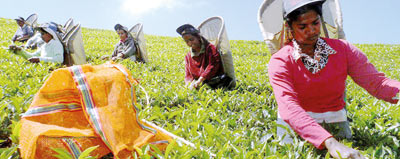Worst crisis in history for Sri Lanka’s tea industry

J. Gamini Jayawardena
The tea industry in Sri Lanka is encountering a severe financial crisis which hasn’t been a experienced in the recent past. Ironically, no responsible higher authorities seem to have focused on this vital national issue so far to counteract or to mitigate the impact. The tea industry has generated foreign exchange exceeding US$1.8 billion and provided job opportunities directly and indirectly to 2 million people, 10 per cent of the total population. Therefore this industry provides economic and social benefits to the country and in the event of the collapse of this valuable industry we will have severe repercussions socially and economically.
Prices
Whenever there is crisis in the world, it invariably has a direct impact on the Colombo Tea Auction.
Due to the recession in the US in 2008 together with a decline in crude oil prices there was a direct negative impact on our tea prices during this period. As a result more than 400,000 smallholders and regional plantations companies were at a quandary and it came to a stage when they could not continue their day-to-day operations. At that point the tea factories enforced strict quality controls in quality of green leaf and leaf of poor standards were rejected aiming towards less quantity and quality product.
Sri Lanka tea, Middle East, Russia
Out of total production of Sri Lanka tea more than 60 per cent is directly purchased by West Asia and Russia. The largest importer is Russia which accounts for 15 per cent of the total production and is followed by UAE, Iran, Syria, Turkey, Libya, Iraq, Azerbaijan and Japan.
A few months back due to the UN sanctions against Iran our teas suffered at the Colombo auction. Then the US embargo on Russia and the devaluation of the Rouble, ISIS activities in Syria and Iraq and Libiya further aggravated our sales and marketing efforts. The position worsened with the fall in oil prices.
Depressed tea market
In 2014 January, the low country tea average was Rs. 544.71; since then every month there is a decline in the market and the average a month ago was only Rs. 370. During the period of 18 months for the first time in Sri Lankan history tea prices have com down by Rs. 174 or US$1.27 per kg.
Cost of production
The Colombo auction fetched the highest prices in the world for Sri Lankan tea. Ironically the highest cost of product and lowest productivity is also recorded in Sri Lanka. Thus, the benefit of the prices always overshadowed the cost factor thus on the decline market.
Darkest era in the tea industry
In 2008 during the crisis period there was a direct impact on the tea smallholders where according to the Tea Board formula, bought leaf rate was below the cost of cost of production which was Rs. 35 to Rs. 45. As a result they were not able to maintain their smallholdings and an absolute crisis position was experienced. But this year the position is quite contrasting. As per election pledge the green leaf producer was paid Rs. 73 to Rs. 80 per kg. To obtain this price as per the Tea Board formula the tea factory should receive a sale average of Rs. 530 to Rs. 540. But according to the present market price of Rs. 370 kg per made tea the rate would be in the range of Rs. 50 to Rs. 54. However the government subsidy costs Rs. 1.5 billion per month to bridge the gap of the bought leaf suppliers and as a result tea smallholders are unaware and are least concerned about the quality of leaf. At the same time, the plantation companies are faced with a severe financial crisis and if this trend continues it will be not able to pay the labour wages and other statutory requirements. There are about 650 tea factories functioning in Sri Lanka, if this trend continues the collapse of some factories are inevitable. But unfortunately due to the government subsidy at a cost of a colossal amount of the taxpayers money the crisis situation on the surface seems to have diluted. If all the aspects are analysed in detail the situation is one of the worst in history and as a result a top revenue earner which has social benefit of the country is in serious trouble.
Modality and the Colombo
Tea Auction
The government should immediately declare an emergency situation on the tea crisis as per the accepted norms. Initially, the decision-makers (political hierarchy, Ministry of Plantations and Ministry of Finance) together with all the tea stakeholders should interact. At this forum, economists from the state sector should participate to work out a strategy based on long-short term on the following factors:
a. Every week at the Colombo auction – 6 million to 8 million kg of tea is on offer. Due to the financial crisis in buying countries, the Colombo auction has become very docile in respect of bidding for teas. Therefore, to create a demand at the auction floor, as done in 2008 the Tea Board should intervene for bidding and purchasing teas to create a demand.
b. A scientific study needs to be carried out for future demand based on the above purchase of the teas which should be done so that the government could incur a profit in the future.
c. It is relevant to place on record when the Kenya tea market dropped tea smallholders threatened to uproot the tea and thereafter the Government took a similar decision.
d. Countries like Iran have special demand for our teas. They have the crude oil and our Petroleum Corporation refineries are ideally geared to refine crude oil from Iran. Therefore, as we have done in the past with China under the rubber-rice pact we should explore the possibility of an oil and tea pact for the benefit of the two countries.
e. China has the largest population of the world and the younger generation has developed a culture of tea drinking. Therefore, since we have large Chinese projects we should look into the possibility of a large scale market penetration.
f. It has been pointed out by a number of foreign buyers over the years that the quality of tea in Sri Lanka has deteriorated to a greater degree. This is mainly due to the quality of raw material and unethical practices carried out by certain factories. Therefore, legislation should be introduced and made compulsory on plucking of leaf and rigid laws should be enforced on adulteration of teas in the tea factories.

File picture of Tea workers.
g. The Government should look into the possibility of giving the maximum benefit of the crude oil reduction to the tea sector to counteract the high cost of production.
The industry counts more than 140 years. This industry should be carried forward for the next 100 years or more. If this trend continues the entire system would collapse. Therefore, it is the responsibility of all concerned to rectify this crisis immediately.


